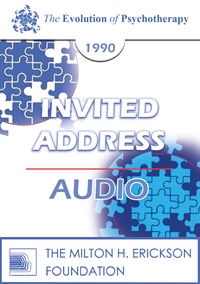
- Average Rating:
- Not yet rated
- Topic Areas:
- Invited Addresses | Trauma | Brief Therapy | Children and Adolescent Therapy | Psychotherapy | Redecision Therapy
- Categories:
- Evolution of Psychotherapy | Evolution of Psychotherapy 1990
- Faculty:
- Mary Goulding, MSW | Judd Marmor
- Duration:
- 1 Hour 26 Minutes
- Format:
- Audio Only
- Original Program Date:
- Dec 13, 1990
- Short Description:
- Today and in the immediate future, short-term therapy is a major available treatment for most clients. In this paper, I will discuss the use of Short-Term Redecision Therapy in the resolution of major childhood traumas, such as physical, sexual, and mental abuse. In Redecision Therapy, the client remembers, re-enacts, uses therapeutically, and then discards these early traumatic scenes.
- Price:
- $15.00 - Base Price
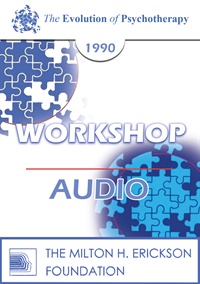
- Average Rating:
- Not yet rated
- Topic Areas:
- Workshops | Group Therapy | Psychotherapy | Redecision Therapy
- Categories:
- Evolution of Psychotherapy | Evolution of Psychotherapy 1990
- Faculty:
- Mary Goulding, MSW
- Duration:
- 2 Hours 32 Minutes
- Format:
- Audio Only
- Original Program Date:
- Dec 16, 1990
- Short Description:
- A therapy group will be formed from Conference participants, in order to demonstrate what can be accomplished in a single group session. Emphasis will be on establishing therapeutic contracts for change and using the past to effect this change. Discussion and whole-group experiences will follow the therapy demonstration.
- Price:
- $15.00 - Base Price
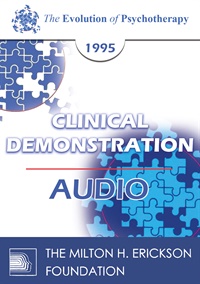
- Average Rating:
- Not yet rated
- Topic Areas:
- Clinical Demonstrations | Redecision Therapy | Brief Therapy | Psychotherapy
- Categories:
- Evolution of Psychotherapy | Evolution of Psychotherapy 1995
- Faculty:
- Mary Goulding, MSW
- Duration:
- 57 Minutes
- Format:
- Audio Only
- Original Program Date:
- Dec 16, 1995
- Short Description:
- Educational Objectives: To list three viable contracts for change by the patient. Ballroom ABC To describe the use of early child scenes in making changes in the present.
- Price:
- $15.00 - Base Price
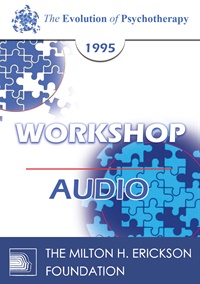
- Average Rating:
- Not yet rated
- Topic Areas:
- Workshops | Redecision Therapy | Memory | Psychotherapy
- Categories:
- Evolution of Psychotherapy | Evolution of Psychotherapy 1995
- Faculty:
- Mary Goulding, MSW
- Duration:
- 1 Hour 29 Minutes
- Format:
- Audio Only
- Original Program Date:
- Dec 13, 1995
- Short Description:
- Memories may be treated as one-act dramas, dialogues or dreams, as volunteers use them, incorporate them in new ways and let them return to the past. Demonstration, with audience volunteers, of a single childhood memory to make changes in their current lives will illustrate Redecision Therapy.
- Price:
- $15.00 - Base Price
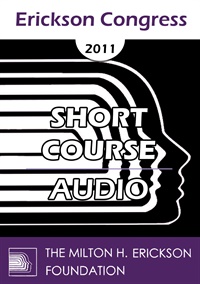
- Average Rating:
- Not yet rated
- Topic Areas:
- Short Courses | Redecision Therapy | Ericksonian Hypnosis and Therapy Techniques | Transactional Analysis | Brief Therapy
- Categories:
- Erickson Congress | Erickson Congress 2011
- Faculty:
- Janet Lee O'Connor, EdS | Del Worley, MC
- Duration:
- 1:19:29
- Format:
- Audio Only
- Original Program Date:
- Dec 09, 2011
- Short Description:
- This presentation will demonstrate the utilization of the Ericksonian position on change within the framework of Redecision Transactional Analysis. Permission, co-creating a unique response, develop-mental meaning of symptoms, and creating new responses to the environment will be illustrate using volunteers attending the program.
- Price:
- $15.00 - Base Price

- Average Rating:
- Not yet rated
- Topic Areas:
- Redecision Therapy
- Categories:
- Italian | World Languages
- Faculty:
- Mary Goulding, MSW | Robert L. Goulding, MD
- Duration:
- 1 Hour 49 Minutes
- Format:
- Audio and Video
- Original Program Date:
- Sep 24, 2019
- Price:
- $59.00 - Base Price
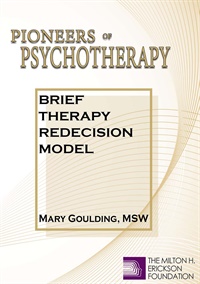
- Average Rating:
- Not yet rated
- Topic Areas:
- Clinical Demonstrations | Redecision Therapy | Brief Therapy | Psychotherapy | Relationships
- Bundle(s):
- Women Pioneers of Psychotherapy | Pioneers of Psychotherapy Bundle
- Categories:
- Pioneers of Psychotherapy | Evolution of Psychotherapy | Evolution of Psychotherapy 1995
- Faculty:
- Mary Goulding, MSW
- Course Levels:
- Master Degree or Higher in Health-Related Field
- Duration:
- 00:59:00
- Format:
- Audio and Video
- Original Program Date:
- Dec 15, 1995
- Short Description:
- Mary Goulding (1995) demonstrates with three volunteer clients. The first is disturbed because his mother did not spend much time with him during childhood. Next Dave is concerned about his distant relationship with his son. The third, Diane describes problems with her mother who is now a widow and overly critical. Goulding explains her work.
- Price:
- $59.00 - Base Price
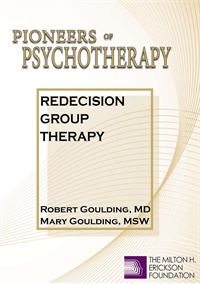
- Average Rating:
- Not yet rated
- Topic Areas:
- Clinical Demonstrations | Group Therapy | Redecision Therapy | Psychotherapy | Confrontation | Humor
- Bundle(s):
- Pioneers of Psychotherapy Bundle
- Categories:
- Pioneers of Psychotherapy | Evolution of Psychotherapy | Evolution of Psychotherapy 1985
- Faculty:
- Mary Goulding, MSW | Robert L. Goulding, MD
- Course Levels:
- Master Degree or Higher in Health-Related Field
- Duration:
- 00:58:00
- Format:
- Audio and Video
- Original Program Date:
- Dec 13, 1985
- Short Description:
- Robert and Mary Goulding (1985), working as cotherapists, demonstrate using five volunteer clients. The concerns of each individual are addressed during the therapy session. The Gouldings help define each person’s goals and establish a contract for change. The session includes role-play, fantasy, confrontation and the use of humor.
- Price:
- $59.00 - Base Price
Please wait ...

